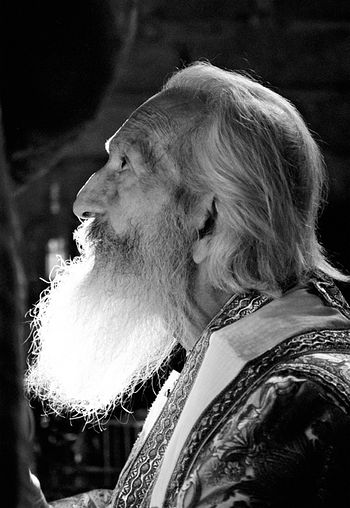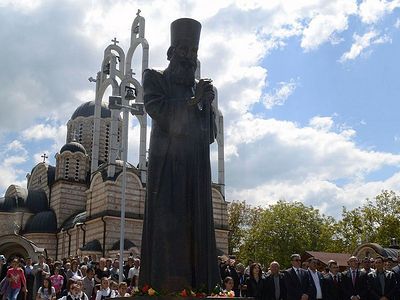From the book of sermons and talks of the Serbian Patriarch Pavle “Walk to Eternity. Selected Sermons. Interviews,” published by Sretensky Monastery.
***
Again, ye have heard that it hath been said by them of old time, Thou shalt not forswear thyself, but shalt perform unto the Lord thine oaths: But I say unto you, Swear not at all; neither by heaven; for it is God's throne: Nor by the earth; for it is his footstool: neither by Jerusalem; for it is the city of the great King. Neither shalt thou swear by thy head, because thou canst not make one hair white or black. But let your communication be, Yea, yea; Nay, nay: for whatsoever is more than these cometh of evil. Ye have heard that it hath been said, An eye for an eye, and a tooth for a tooth: But I say unto you, That ye resist not evil: but whosoever shall smite thee on thy right cheek, turn to him the other also. And if any man will sue thee at the law, and take away thy coat, let him have thy cloak also. And whosoever shall compel thee to go a mile, go with him twain (Mt. 4:33-41).
The Lord reminds us that we should not swear, that we should have such love of truth between us, such trust, that it’s enough to say “yes” and it will be “yes,” or “no” and it will be “no.” Of course, in important cases the Church allows oaths for the sake of ascertaining the truth, especially in court. We know from Holy Scripture that the Lord once “swore by Himself.” It’s not that you can absolutely never use oaths, but that we should try to be so truth loving, for God is Truth, and the devil is a liar and the father of lies. In this sense we must love Truth. And again I repeat it. In the old Mosaic Law it is said: eye for eye, tooth for tooth (Ex. 21:24). It was a higher rule of law than its predecessors. Lamech, having two wives, said he killed the husband to his wounding and the young man to his hurt (see Gen. 4:23). And the Law of Moses appears, saying: eye for eye, tooth for tooth, hand for hand, foot for foot (Ex. 21:24); as much as they did to you, so much you could do in return. And finally, the Lord instructs us to do more, to begin to resist evil. The Lord says: do not resist evil with violence. It’s not to absolutely never resist evil—that would be passivity, the destruction of the distinction between good and evil, but to not resist with violence, not to return evil with evil. And the apostle Paul says:
Be not overcome of evil, but overcome evil with good (Rm. 12:21). This is the meaning of Christ’s speech, but, I repeat, not literally. Because, when He was before the court and when the servant struck Him, He did not offer the left cheek, but pronounced: If I have spoken evil, bear witness of the evil: but if well, why smitest thou me? (Jn. 18:23). I think you understand, what this is about. We should be prepared to overcome the evil directed at us with good, to seek the opportunity to rectify the sinner, to do everything that he might understand the weight of his sin. In any case, we should not be passive, but should take the initiative and turn it towards the good. How many true miscreants have become Christians because Christians followed these words of Christ and loved their enemies, trying to guide them to repentance?
May the Lord help to establish a love of truth between us, to love even our adversaries: to pray to God, to show them with our very lives that they are tumbling in a spiritual abyss, in eternal darkness, and that they must repent and be saved.
May God bless you!




